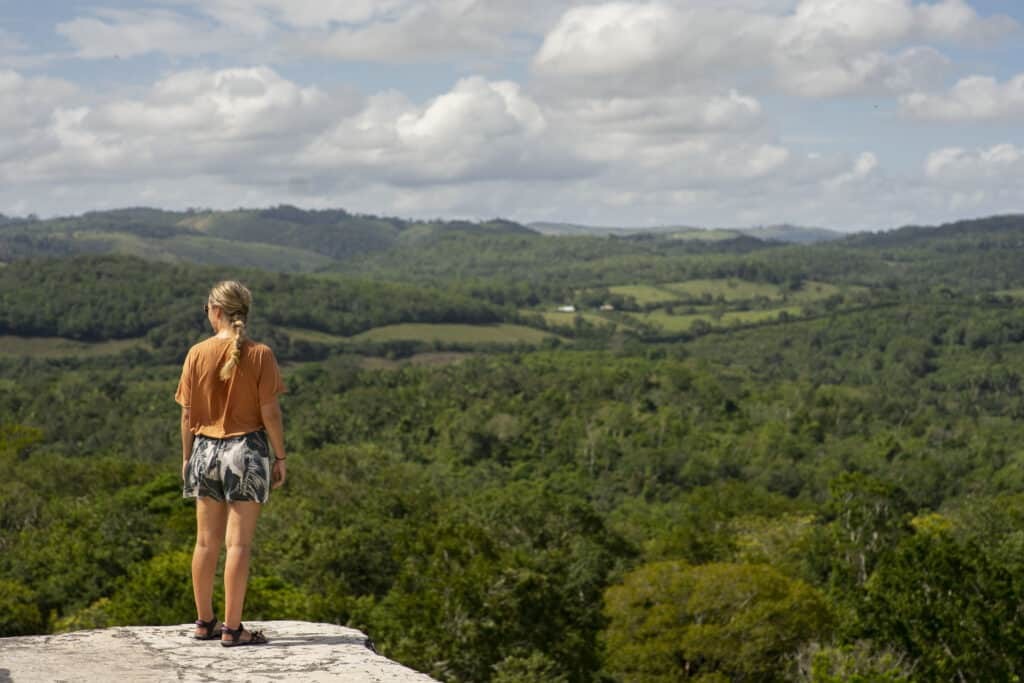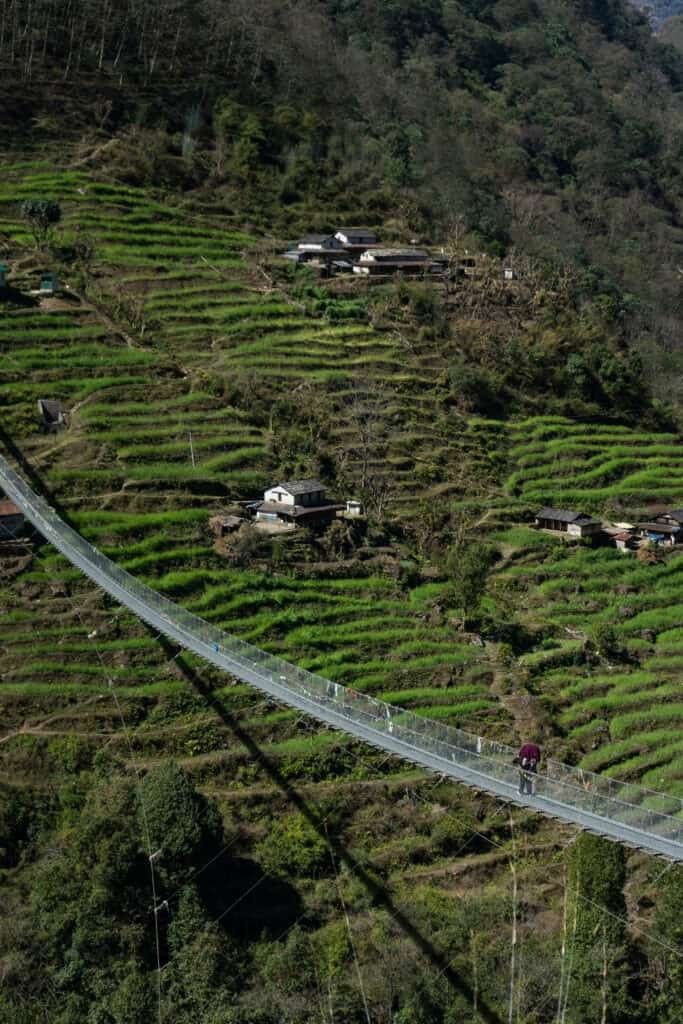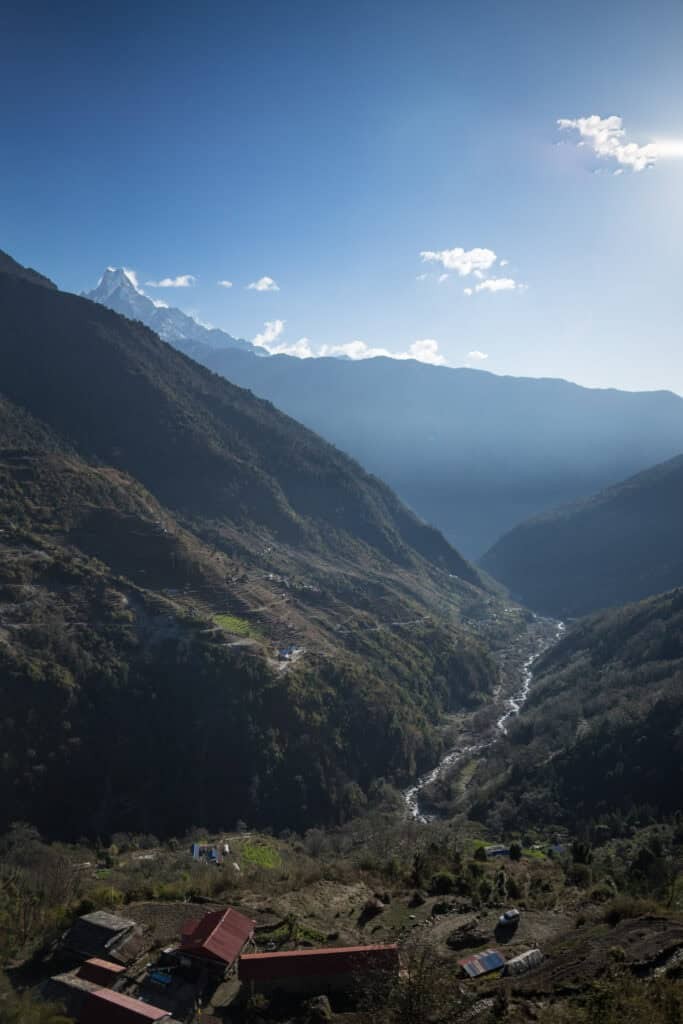Sustainable tourism in Vietnam is key to preserving its beauty and culture for future generations, and SIXT.VN is here to help you explore responsibly. By choosing eco-friendly options and supporting local communities, you can ensure your travels have a positive impact, contributing to sustainable travel practices and responsible tourism initiatives.
1. Understanding the Impact of Tourism
Tourism, with its hundreds of millions of global travelers, wields significant economic power. In 2021, the global tourism market was estimated at approximately $1.31 trillion U.S. dollars. This highlights the importance of understanding its multifaceted impact.
1.1. The Upsides of Tourism
Tourism can be a powerful force for good, strengthening communities through increased income, improved infrastructure, and greater resources. It boosts employment rates, safeguards cultural heritage and languages, and fosters deeper cross-cultural understanding.
1.2. The Downsides of Tourism
However, the tourism industry also has a dark side. Overtourism can negatively impact the quality of life for local communities, deplete natural resources, and lead to gentrification. In some cases, communities can become overly reliant on tourism, and cultural experiences can become commodified and lose their authenticity, a phenomenon known as “disneyfication.”
 Woman overlooking a lush forest, symbolizing sustainable tourism
Woman overlooking a lush forest, symbolizing sustainable tourism
2. What Exactly is Sustainable Tourism?
The World Tourism Organization defines sustainable tourism as tourism that considers the current and future economic, social, and environmental impacts. It addresses the needs of visitors, the industry, the environment, and host communities.
Sustainable tourism seeks to mitigate the negative impacts of the tourism industry and create models that protect both people and the planet. It is a solution for addressing the harmful effects of unsustainable tourism practices.
2.1. Why is Sustainable Tourism Important?
Sustainable tourism ensures that the benefits of tourism outweigh the negatives, making it a positive force. By embracing sustainable models, we can protect people, culture, heritage, language, wildlife, natural resources, and the environment, safeguarding everything that makes our planet special.
Sustainable travel means committing to traveling in a way that minimizes your impact. This approach reduces the effects of overtourism, supports local and Indigenous communities, protects natural resources and wildlife, and encourages responsible travel. Sustainable tourism helps every tourist become a more responsible traveler and provides opportunities to give back to the regions and communities we visit.
3. Exploring the Different Types of Sustainable Tourism
While the term “sustainable” is often associated with environmental concerns, in the context of tourism, sustainability extends beyond nature and wildlife. It encompasses people, culture, and social issues.
Global sustainable tourism can be broken down into two key categories: Environmental and Socio-Cultural.
3.1. Environmental Sustainability
A 2018 study by Nature Climate Change revealed that tourism accounts for 8% of global greenhouse gas emissions. This significant impact underscores the importance of environmental sustainable tourism.
Environmental sustainable tourism focuses on protecting wildlife from the impact of tourism, increasing wildlife conservation, protecting wildlife habitats, creating protected natural areas, and ensuring natural resources are not depleted by tourism.
3.2. Socio-Cultural Sustainability
Socio-cultural sustainable tourism centers on maintaining and improving the quality of life for people in tourist destinations, protecting culture and language, and conserving natural and cultural heritage sites. It aims to ensure that local communities benefit economically and socially from tourism.
Both environmental and socio-cultural concerns are critical to sustainable tourism. Together, they ensure that tourism benefits both people and the planet.
4. Five Key Reasons Why Sustainable Tourism Matters
4.1. Enhanced Experiences for Everyone
Sustainable tourism creates better experiences for both travelers and locals. Its focus on generating a positive and regenerative impact, while minimizing harm, ensures that locals tangibly benefit from tourism and visitors enjoy more authentic and meaningful experiences.
4.2. Combating Overtourism
Overtourism, characterized by excessive numbers of tourists in one place, can have detrimental effects on destinations and visitors alike.
Crowds diminish the quality of life for locals and tourists, and overtourism can create economic dependence on tourism. Government policies and marketing strategies aimed at reducing overtourism can lead to better balance and encourage tourists to explore lesser-known destinations.
4.3. Protecting Natural Environments and Supporting Conservation
The desire to visit natural areas provides the motivation and means to protect them. For example, Algonquin Provincial Park leverages tourism revenue to support conservation and protection efforts.
Tourism incentivizes governments and organizations to implement environmentally focused policies and conservation measures, such as creating national parks, nature reserves, and other protected areas. Conservation initiatives around the globe also promote better treatment of animals and wildlife in the tourism industry. As awareness of responsible wildlife tourism grows, the industry is shifting from interactive wildlife experiences to observation-only experiences, ensuring that wild animals remain wild.
4.4. Empowering Local Communities
One of the greatest benefits of tourism is its economic impact. Both small communities and entire countries can benefit greatly from the revenue generated by tourism.
For example, in 2023, Portugal’s GDP was projected to reach almost €39.5 billion, representing 17.4% of the entire economy. This contribution leads to wider benefits for a community and country, supporting infrastructure, providing resources for locals, and generally improving their quality of life.
4.5. Fostering Learning and Cultural Understanding
Sustainable tourism aims to create a positive relationship between communities and visitors, leading to numerous benefits.
Interaction through tourism fosters learning for both locals and tourists, allowing them to learn about each other’s cultures, practices, and norms. This creates mutual cultural understanding and helps to eradicate cultural biases and ethnocentrism, as well as problematic cultural appropriation. Travelers can also use tourism as an opportunity to learn about history, politics, and global dynamics.
5. Developing Sustainable Tourism Practices
The responsibility for developing sustainable tourism rests on a diverse group of players in the tourism industry, including governments, tourism boards, tourism operators, marketers, and airlines.
The first step in developing sustainable tourism is education. Players across the industry must be well-informed about sustainability issues and how to address them. Strategies for promoting sustainable tourism include tax incentives for adopting carbon-neutral solutions, controlling access to popular sites, and marketing campaigns that highlight lesser-known destinations.
Incentives are also crucial for developing sustainable tourism, whether in the form of governmental policy or tourist demand. For example, if more tourists choose eco-conscious hotels, the hotel industry will recognize the importance of sustainability to travelers and be incentivized to adopt more eco-friendly practices.
Achieving sustainable tourism is a continuous process that requires the participation of everyone involved in or adjacent to the tourism industry.
 Scenic canyon view in Iceland, emphasizing natural beauty
Scenic canyon view in Iceland, emphasizing natural beauty
6. How You Can Be a Sustainable Tourist in Vietnam with SIXT.VN
Building sustainable tourism models requires effort from the travel industry, but individual tourists can also make a significant impact.
6.1. Support Sustainable Businesses with Your Spending
As a tourist, you can influence the travel industry by choosing to spend your money on hotels, tours, experiences, and transportation options that are committed to sustainability. Before booking accommodation or tour operators, do some research. Look for public mentions of sustainable practices on their website and read reviews to see what other travelers have observed.
For example, if you’re renting a vehicle for your trip, consider renting an electric vehicle. By choosing electric cars whenever possible, you send the signal that there’s demand for electric cars over gas cars.
6.2. Advocate for Sustainable Travel
Making sustainability part of the tourism conversation is a simple but effective way to promote it. Talking about sustainable tourism raises awareness and encourages more travelers to make sustainable choices. It also emphasizes to companies and organizations in the tourism industry that sustainable tourism is essential and worth investing in.
6.3. Practice Sustainable Habits During Your Trip
There are simple things that every person can do on their own travels to help reduce their impact. As mentioned above, start by booking the most sustainable options for flights, hotels, tour operators, etc. Minimize short-haul flights, travel lightly, pack zero-waste and reusable toiletries, and use a water filtration system to avoid buying bottled water.
6.4. SIXT.VN’s Role in Promoting Sustainable Tourism in Vietnam
SIXT.VN is committed to promoting sustainable tourism practices in Vietnam by offering services that minimize environmental impact and support local communities. Here’s how SIXT.VN contributes to sustainable tourism:
- Eco-Friendly Transportation Options: SIXT.VN provides options for electric and hybrid vehicles, reducing carbon emissions and promoting cleaner air.
- Support for Local Businesses: SIXT.VN partners with local hotels, restaurants, and tour operators that adhere to sustainable practices, ensuring that tourism revenue benefits the community.
- Sustainable Tour Packages: SIXT.VN offers tour packages that focus on eco-friendly activities, such as nature walks, visits to national parks, and cultural experiences that respect local traditions.
- Responsible Travel Education: SIXT.VN provides resources and information to travelers on how to be responsible tourists, including tips on reducing waste, conserving water, and respecting local customs.
By choosing SIXT.VN, you can be confident that your travel choices are contributing to a more sustainable future for Vietnam.
6.5. Partnering with Sustainable Accommodations
SIXT.VN actively seeks out and partners with hotels and resorts that have demonstrated a commitment to sustainable practices. These accommodations often implement initiatives such as:
- Energy Efficiency: Using energy-efficient lighting, appliances, and HVAC systems.
- Water Conservation: Implementing water-saving fixtures and practices.
- Waste Reduction: Reducing waste through recycling, composting, and minimizing single-use plastics.
- Sustainable Sourcing: Sourcing food and other products from local and sustainable suppliers.
- Community Engagement: Supporting local community initiatives and cultural preservation efforts.
By staying at these eco-friendly accommodations, travelers can minimize their environmental impact and support businesses that are dedicated to sustainability.
6.6. Encouraging Responsible Consumption
SIXT.VN encourages travelers to make responsible consumption choices during their trips to Vietnam. This includes:
- Supporting Local Businesses: Shopping at local markets and artisan shops to support local economies and preserve traditional crafts.
- Eating Local Cuisine: Trying local dishes made with fresh, seasonal ingredients to reduce the environmental impact of food transportation.
- Reducing Waste: Avoiding single-use plastics by bringing reusable water bottles, shopping bags, and containers.
- Conserving Water: Being mindful of water usage and taking shorter showers.
- Respecting Local Customs: Dressing modestly when visiting religious sites and being respectful of local traditions and customs.
By making these small changes, travelers can significantly reduce their environmental footprint and contribute to the well-being of local communities.
6.7. Promoting Cultural Preservation
SIXT.VN is committed to promoting cultural preservation and supporting initiatives that protect Vietnam’s rich cultural heritage. This includes:
- Partnering with Cultural Organizations: Working with local cultural organizations to promote traditional arts, crafts, and music.
- Supporting Cultural Tourism: Encouraging travelers to visit cultural sites and participate in cultural experiences that benefit local communities.
- Promoting Responsible Souvenir Shopping: Encouraging travelers to buy souvenirs that are ethically sourced and support local artisans.
- Educating Travelers: Providing information to travelers on the importance of respecting local customs and traditions.
By supporting cultural preservation efforts, SIXT.VN helps to ensure that Vietnam’s cultural heritage is preserved for future generations.
6.8. Showcasing Ecotourism Destinations
SIXT.VN highlights ecotourism destinations in Vietnam that offer unique opportunities to connect with nature and support conservation efforts. These destinations often feature:
- National Parks and Nature Reserves: Protected areas that offer opportunities for hiking, wildlife viewing, and other outdoor activities.
- Community-Based Tourism Initiatives: Tourism projects that are owned and operated by local communities, providing economic benefits and empowering local people.
- Eco-Lodges and Resorts: Accommodations that are designed to minimize their environmental impact and support conservation efforts.
- Sustainable Agriculture Projects: Farms and plantations that use sustainable farming practices to produce food and other products.
By showcasing these ecotourism destinations, SIXT.VN encourages travelers to explore Vietnam’s natural beauty while supporting conservation efforts and local communities.
6.9. Educating Travelers on Sustainable Practices
SIXT.VN provides resources and information to travelers on how to be sustainable tourists in Vietnam. This includes:
- Travel Guides and Blog Posts: Articles and guides that offer tips on reducing waste, conserving water, respecting local customs, and supporting local businesses.
- Sustainable Travel Checklists: Checklists that help travelers plan and pack for sustainable trips.
- Presentations and Workshops: Educational events that provide travelers with information on sustainable tourism practices.
- Social Media Campaigns: Social media campaigns that promote sustainable tourism and raise awareness of environmental and cultural issues.
By educating travelers on sustainable practices, SIXT.VN empowers them to make informed choices and travel responsibly.
By integrating these sustainable tourism practices into its operations, SIXT.VN aims to be a leader in promoting responsible and eco-friendly travel in Vietnam. SIXT.VN’s commitment to sustainability extends beyond simply offering eco-friendly options; it also includes actively engaging with local communities, supporting cultural preservation efforts, and educating travelers on how to minimize their environmental impact.
SIXT.VN believes that sustainable tourism is not just a trend, but a necessity for preserving Vietnam’s natural beauty and cultural heritage for future generations. By choosing SIXT.VN, travelers can be confident that they are contributing to a more sustainable and responsible tourism industry.
7. Sustainable Tourism in Vietnam: A Call to Action with SIXT.VN
As travelers, we have the power to make a difference. By choosing sustainable options, supporting local communities, and respecting the environment, we can ensure that our travels have a positive impact.
SIXT.VN is committed to helping you explore Vietnam in a responsible and sustainable way. We offer a range of services that minimize environmental impact and support local communities, including:
- Eco-Friendly Transportation Options: Choose from our selection of electric and hybrid vehicles for a greener way to get around.
- Sustainable Tour Packages: Explore Vietnam’s natural beauty and cultural heritage with our eco-friendly tour packages.
- Partnerships with Local Businesses: Support local communities by staying at our partner hotels and resorts that adhere to sustainable practices.
Ready to plan your sustainable adventure in Vietnam? Visit SIXT.VN today to learn more about our services and book your eco-friendly travel experience.
Address: 260 Cau Giay, Hanoi, Vietnam
Hotline/Whatsapp: +84 986 244 358
Website: SIXT.VN
 Aerial view of terraced farmland in Nepal, showcasing sustainable agriculture
Aerial view of terraced farmland in Nepal, showcasing sustainable agriculture
8. Frequently Asked Questions About Sustainable Tourism
8.1. What is sustainable tourism and why is it important?
Sustainable tourism is tourism that considers its economic, social, and environmental impacts, addressing the needs of visitors, the industry, the environment, and host communities. It’s important because it ensures tourism benefits outweigh negatives, protecting people, culture, and the planet.
8.2. How does sustainable tourism differ from traditional tourism?
Traditional tourism often focuses on economic benefits without considering environmental and social impacts. Sustainable tourism, however, aims to minimize negative impacts and maximize positive contributions to local communities and the environment.
8.3. What are the main types of sustainable tourism?
The main types are environmental sustainability, which focuses on protecting natural resources and wildlife, and socio-cultural sustainability, which focuses on maintaining and improving the quality of life for local communities and preserving cultural heritage.
8.4. How can I be a more sustainable tourist?
You can be a more sustainable tourist by supporting eco-friendly businesses, reducing your environmental impact through responsible consumption, advocating for sustainable travel, and educating yourself about sustainable practices.
8.5. What is overtourism and how does sustainable tourism help reduce it?
Overtourism is when too many tourists visit a single place at one time, negatively impacting local communities and the environment. Sustainable tourism reduces overtourism by encouraging visitors to explore lesser-known destinations and promoting responsible travel habits.
8.6. What role do local communities play in sustainable tourism?
Local communities are central to sustainable tourism. Their involvement ensures that tourism benefits them economically and socially, and that their culture and heritage are respected and preserved.
8.7. How does SIXT.VN contribute to sustainable tourism in Vietnam?
SIXT.VN contributes by offering eco-friendly transportation options, partnering with local businesses that adhere to sustainable practices, providing sustainable tour packages, and educating travelers on responsible travel.
8.8. What are some examples of sustainable accommodations in Vietnam?
Examples include hotels and resorts that implement energy-efficient practices, conserve water, reduce waste, source food locally, and engage with local communities.
8.9. How can I find sustainable tour operators in Vietnam?
Look for tour operators that are certified by reputable organizations, have a commitment to environmental and social responsibility, and involve local communities in their operations.
8.10. What is the future of sustainable tourism in Vietnam?
The future of sustainable tourism in Vietnam looks promising, with increasing awareness and demand for responsible travel. Continued efforts by governments, businesses like SIXT.VN, and travelers will help ensure that tourism benefits both people and the planet for generations to come.



